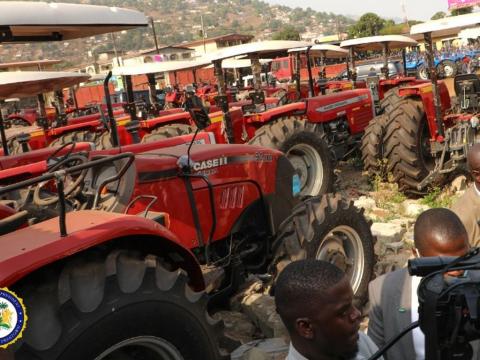By Alpha Abu
410 tractors, fertilizer applicators, seed broadcasters and power tillers valued at over $18 million have arrived in Sierra Leone to support private sector farmers in mechanised farming.
They are to be pre-positioned in seven centres to service the numerous farmer groups across the country.
Explaining to journalists, Minister of Agriculture and Forestry, Dr. Abubakarr Karim explained the diverse and expansive agricultural projects that the government has embarked on in different parts of the country.
He said they would be prioritising improved private farmers’ participation in the agricultural sector, a shift from “direct government-led support system for farmers”. He said the new policy would go into minimising the inefficiencies of the past and put premium on “leveraging technology for better accountability”.
Dr. Karim disclosed that on the 1 February 2020 government would start making available $10 million, out of $50 million apportioned for private sector farmers to access on credit basis. He said they would not be given the cash amount but rather invest the money into fertiliser import and distribution, agrochemicals and processing equipment.
The ministry has promised to announce to the public in due course the modalities designed for farmers that stand to be recruited for such facilities. There are also plans to introduce, this year, a $ 5 million E-Voucher system for vulnerable farmers through accessing agricultural inputs. 30,000 farm households are to be included in the programme for an initial period of three years.
The regulatory bodies related to the various Acts and Policies on fertiliser and seed certification are now being recruited and the requisite structures such as laboratories erected.
The Moyamba District Rice Value Chain Project has reportedly started, incorporating Njala University‘s “Enabled Youths Project”, says to the minister.
Apart from the various rice projects being implemented across Sierra Leone, the Agriculture minister revealed plans by the government to embark on “rapid” onion production to reduce the high importation of the vegetable. Port Loko, Falaba, Moyamba and Koinadugu districts have been identified for the onion production for which funds by government and partners will be made available to start and also scale up the project.
Already work is on in Bonthe, Port Loko and Kambia districts for rice cultivation projects by the government, to drastically reduce overreliance on imported rice. Thousands of farmers and foreign investment partners are involved in the production of the country’s staple food.
Copyright © 2021 Politico Online








